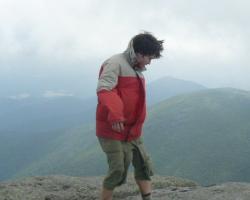Garfield
Folder:
Short Stories Garfield looked at himself in the stained, discolored bathroom mirror of the old house. His eyes gazed his barren head. What had once been a blooming garden, thick with young hair, had decayed to a desertous wasteland of baldness. His scalp shone with a daring pink. His smooth skin had puckered to form a wrinkled, thick surface. His chest was flopped downward. His hearing dwindled, teeth vacant, vision shrank, and the sour scent of pipe tobacco was thick upon his tux. Where had it gone? Where were all his years now? The summer of youth had wintered off, the day bruised into night.
Death was always the thing that kept him living, but as he felt its clammy grip upon his steady heart, upon the rope around his neck, he felt otherwise. He sweated like an angry rainstorm, brewing thunder. Death made life worth living for Garfield, but now he regretted ever thinking such a thought. Death was not what made life worth living, he realized. Death was what made life a slow decay, a dying flower. He regretted all those years of useless thought. Life, now, was not a present, death was a present, life the past. He then realized that in order to die, one must live in turn. They were equal, parallel, perpetually dependent upon each other.
A tear sprouted from his brown eye, like a newborn from a broadened womb. His eyes were the only thing not completely encumbered by age, though his vision had dulled. Garfield’s eyes were constant, a steady infancy. He tightened the rope, the knot within his throat even more intense. He had no control over when he died, until now. He would die of his own hands, his whole life within his palms. He felt the thrill of playing God, of clutching death for himself, by his own watch, not time’s watch. He kicked the chair out from under him, and was suspended by the noose. The tear plunged to the floor, a silent plummet. It splattered.
It was Garfield’s 100th birthday that day, and what was left for his family was found. It seemed his generation had been edging to extinction. His sisters and brothers were all long dead, as were their spouses. He never married. So he lays six feet under now, with the rest of his generation, never to see the sunlight again, never to flicker an eyelash evermore. He has become the soil, become a part of this earth’s foundation. He sleeps, silent and slow, in permanent peace.
